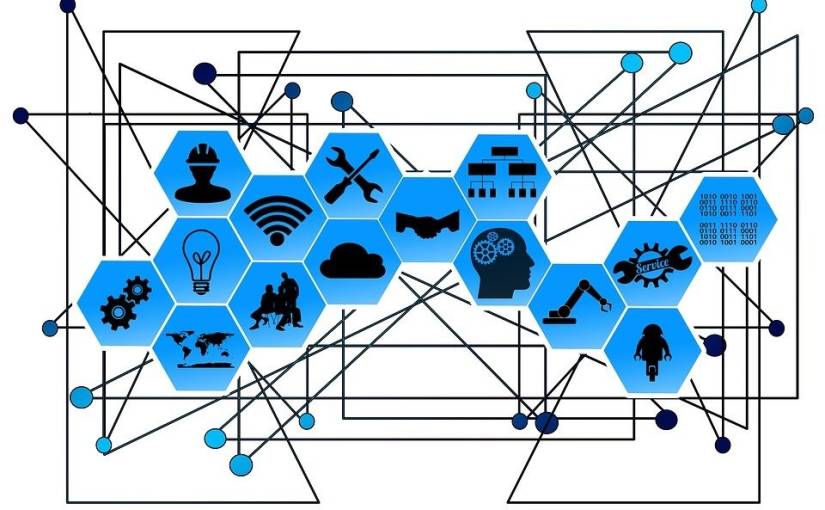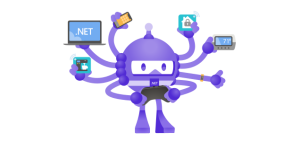The internet today is widely accessible to a large part of the developed and developing world and even many third-world countries. However, it’s the developed and developing world where it has made major strides in the last couple of decades, rising from a simple way of connectivity into a complex web of interconnected devices and services.
That development has opened up new avenues and applications for scientists and businesses to explore, one of which is called the Internet of Things. Also known as IoT, it came into vogue in the past decade and has seen a dramatic rise in usage since the introduction of faster cellular networks in the form of 4G and 5G.
Image Credit: dotnet.microsoft.com
Moreover, with the world steadily moving towards more powerful smart devices and wearables, IoT development has seen an unprecedented boom. However, with new types of devices being added to the list of IoT-capable every day, some questions arise.
Ask this question: what development framework would perfectly suit the multi-platform support of IoT without compromising functionality or security for the businesses involved?
What is .NET Core?
.NET Core is one of the most popular software development frameworks today. More popular among .NET development fanatics than the .NET framework — it has quickly risen through the ranks to become one of the most used software development technologies of today.
The reason for its meteoric rise to fame, especially when we compare it to the .NET framework — is that it is completely open-source. Still, more importantly, it allows for cross-platform app development. That means that no more will businesses have to create multiple versions of their app to cover their consumer base completely.
Using .NET Core means that all they have to do is create one app, which will be able to run seamlessly on a variety of platforms, including Windows, macOS, and even Linux distros. And the developers can still use their favorite development languages, too — like C#, F#, ASP.NET, and more. Moreover, the addition of Azure Cloud helps businesses create apps designed for scalability, as well as opt for a more global business model.
All in all, .NET Core is a definite improvement over the .NET Framework, which allowed it to compete with the likes of Angular and React, two of the most popular web development technologies today.
What Does .NET Core Offer Its Developers?
There are many benefits to using .NET Core for your business applications. And these benefits are especially useful when you are trying to implement the technology within your IoT solution.
Some of the general benefits include:
- Single codebase for an app, but it can be implemented for multiple software platforms.
- Modern UI frameworks for a better and more intuitive user experience.
- Modern APIs are designed for more expansive functionality
Besides the benefits above, some pros are unique to the field of IoT, and how they can help more businesses implement IoT solutions developed using .NET Core.
Windows 10 IoT Core
This is a special version of Microsoft’s propriety operating system designed for embedded systems used for many industrial and scientific purposes. First released in 2015, Windows 10 IoT Core can run on a variety of low-powered and mass-produced hardware, including Raspberry Pi 2 and 3.
One of the major reasons why Windows 10 IoT Core is so popular is that it comes with a set of comprehensive toolkits as well as many integration options. All this is possible due to the Universal Windows Platform (UWP) that comes bundled with it, as well as Visual Studio IDE and Azure Cloud Platform.
Developers can use the functionality provided by the .NET Core and UWP to create some great apps with IoT capabilities and a UX that allows for seamless usage. And while it’s true that complex and large IoT projects may not be possible for you to implement using Windows 10 IoT Core, it would be perfect for small to medium size applications.
Microsoft Azure Cloud Platform
Microsoft Azure is, arguably, one of the best enterprise-level cloud platforms available today. And one of its most popular uses is to integrate it with different IoT projects. That is because the Microsoft Azure Cloud Platform comes with a proprietary Azure IoT platform as well as IoT accelerators, besides the base features of storage and recovery of data.
For developers, it is Azure’s flexibility, security features, and ease of interoperability that make it such a great option for their IoT applications. They can easily create and deploy apps to Azure Cloud in a matter of a few clicks just by initiating and setting up a runtime in the Dashboard.
And with Microsoft’s own engineers constantly working on improving the Azure experience, it is a great option for those looking for long-term support and innovation.
ASP.NET Core
Many developers are familiar with its older cousin, ASP.NET. However, despite the massive popularity of ASP.NET, the introduction of ASP.NET Core was a game-changer. Unlike ASP.NET, ASP.NET Core is a cross-platform, completely open-source web development framework.
And it has gained a huge number of followers in recent years. Now, .NET developers can easily create robust web apps quickly. And with IoT apps being so popular, ASP.NET Core supports them too. That means that when armed with Windows 10 IoT Core and ASP.NET Core, developers could easily create apps that could be connected to their IoT devices.
Then, by integrating the latest artificial intelligence and deep learning models within their apps, businesses can process the data captured from the IoT devices instantly for quick and easy insights.
Moreover, it supports several other programming languages and has a faster deployment time, efficient security measures, top-tier performance, and easy cloud connectivity. Basically, it supports everything you may need to develop a robust web app.
Rich Online Community
Today, development frameworks and technologies are so expansive that even experienced developers need the help of their peers when implementing something they aren’t familiar with. Platforms like StackOverflow or Github have long been considered essential resources for developers.
However, to find the help you need, you require a community. And .NET Core has one of the biggest and most useful communities for a development environment online. People can ask questions, answer them, or even look up solutions to their issues in previously answered queries.
Moreover, there are many projects available online, courtesy of the .NET OSS (Open Source Software) by Microsoft, which can help you learn the ropes to .NET Core.
IoT in Business — Some Popular Applications
IoT has far more uses than what we generally perceive. The masses desire a home where they can turn off the lights or arm their security system from wherever they might be. They want their wearables to do more than just tell time or notify them about incoming calls, messages, or more.
That is why in recent years, we have seen many different applications of IoT gaining prominence. According to a study conducted by Cisco, IoT solutions will be generating over $14 trillion in revenue ten years from now, playing a major part in boosting accessibility, convenience, and user satisfaction.
And with a Windows 10 IoT Core operating system capable of running on ARM32-based devices, many businesses can incorporate it within their workflow.
Some of the most popular ways businesses can do it include:
- Using big data to predict, notify and reorder stock autonomously for sales operations
- Live monitoring of automobile systems for real-time notifications for smart cars
- Monitoring of remote hubs for companies with modules spread across a wide geographic region
Four reasons Why .NET Core is Perfect for Your Next IoT Project
Now that we know what .NET Core offers us in terms of IoT app development, you might want to know why you should choose .NET Core over the many others available, such as Angular and Python. Well, to put it simply, while Angular and Python are great programming languages that are perfect for their domains, .NET Core offers the stability and support of an established development environment.
And as it’s backed by Microsoft, it has a strong and extensive support network, something which modern development technologies lack. Let’s take a look at a few other reasons why .NET Core is the right choice for your next project.
1- Cross-platform support
With its cross-platform capability, .NET Core allows developers to create apps that are designed to run on multiple different operating systems easily. Moreover, with the recent addition of new front-end APIs, developers can bring a great UI without sacrificing the performance or performance of your IoT app.
2- Easy integration with Azure Cloud
.NET Core allows for quick and easy integration with Microsoft Azure Cloud, which is something essential when developing IoT apps. You can host your app and process your data, all in the cloud, using Azure Cloud, leveraging the quick data handling provided specifically to help develop better IoT apps.
3- Proprietary OS for devices like Raspberry Pi 2 & 3
IoT apps rely on data captured via different devices and then processing them to generate valuable insights. And with .NET Core introducing a proprietary operating system designed specifically for small devices like the ones based on Raspberry Pi 2 and 3, you can now build background services and processes easily and right into the device.
4- Easy Availability of Reusable Code and Solutions Online
Finally, with a large and highly skilled user base, .NET Core has the added benefit of the work and experiences shared by developers, which can be a source of inspiration when you are unaware of how to implement something or solve an issue. This help is often in the form of solutions to issues or even as sample codes for developers to understand and use.
Conclusion
All in all, the new .NET Core is a formidable force, one that needs to be reckoned with. It offers a custom OS designed for small processor boards, cross-platform capability, and a helpful dev community that numbers in the hundreds of thousands. That shows that .NET Core has proven itself to be a worthy option for those looking for the perfect IoT app development technology.
Featured Image Credit: Provided by the Author; Thank you!



















